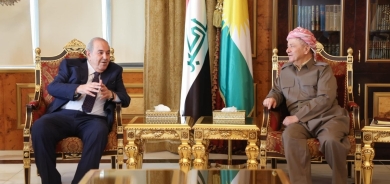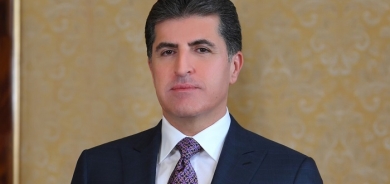Tamar Mayer: you are right in your fighting, stay strong and keep on fighting
January 11, 2015
Exclusive Interviews

Mayer: In two ways. The terrorist groups that we have seen in the past have been on a much smaller scale. I mean, they were local in their orientation, and often associated—the way the west has seen them—with internationalism, with international groups. When stateless ethnonational groups fight for their political goals they often use terrorism. Terrorism has been seen as the stateless person’s army. But ISIS is different. By the fact that they are not an ethnonational group (and therefore have no specific place they call home) they are different. They are interested in moving into everywhere in the Middle East, and all across the world--to the Atlantic ocean, part of north Africa… So, I think that the things to think about are how the appearance of ISIS has changed, not only how and what terrorism is all about, but also how it no longer is a place specific kind of action. The fact is that ISIS has taken a path that is much more pervasive, and intensely mortal and cruel. They are much worse than any terrorist organization that lived in the past.
Gulan: the world has reached the conclusion that ISIS cannot be sorted out by military means alone, and they need other forces to get involved, for example the Islamic countries, since the declaration of Islamic State by ISIS, have not been able to hold a conference for the international Union Muslim scholars to express their position regarding ISIS or condemn their actions. In your opinion, to what extent is it important for the Islamic countries to get involved in anti ISIS coalition?
Mayer: I think first of all we have to define who and what is an Islamic state? Are we looking at Pakistan? Are we looking at Saudi Arabia? They are Muslim states. Are they the same as Egypt or Jordan? I mean you have to be careful how you define Islamic states. The charge for the creation of Pakistan was to create a state for all the Muslims in the world. This was not the charge for the creation of Egypt, Jordan, Syria, or Lebanon. So you really need to be careful when you ask about Islamic countries. For me, the question is what should be the position of all Arab states, not Muslim countries, vis-à-vis ISIS? I think that is really a question. You must separate religion from polity, even though in a few cases, like Saudi Arabia or Iran it is not possible. States are mostly secular entities and were created as such, except, as I mentioned, Pakistan. Having said all this, let me say that it is crucial for Arab countries to take a firm stand against ISIS.
Gulan: but my concern is that, for example, there are very few Islamic countries joined the international anti-Islamic State coalition. The other countries in the coalition are mostly western Christian countries. So to what extent might be combating ISIS change into Islam-Christian war?
Mayer: that is a very good question. I think that if the Arab, not Islamic States want to remain sovereign states, they have to fight ISIS because the idea behind ISIS is that it (ISIS) is going to subsume the Islamic and Arab world and make them part of one big Caliphate. In a Caliphate, there is no state system anymore. I don’t think it needs to be a divide between Muslims and Christians in the world. If the sovereign states of the Arab world want to continue to survive they must fight ISIS. If they don’t they will disappear. ISIS fight is not a war between Islam and Christianity. It is between Islam and Islam, and between darkness and enlightenment.
Gulan: how is it possible to prevent the countries in the region who secretly helping and funding ISIS?
Mayer: Many states in the region may play a double game. Take the example of Qatar. I do not know for sure but I have read that Qatar has been aiding ISIS and at the same time is also very committed to continue to be a state. Perhaps, they want to be able to control ISIS’s activity by funding some of its activities. To talk about Muslim-Christian divide, with regards to ISIS is really, really dangerous and I don’t think is correct.
Gulan: As you Know Kurds are the only people that have been fighting ISIS honestly and bravely, and they have been able to change the dimension of the war and to hold ISIS back. So to what extent is it important for the world to take this position of Kurds into consideration?
Mayer: Absolutely crucial. I have been watching the Kurdish fight for many years and I think that now more people understand the Kurdish plight. First of all, people in the West knew about the attack of Halabja in eighties and their sentiments were with the Kurds. Kurds have received a lot of favorable attention from the world, rightfully so, and I think this support has continued. I think the Kurds are doing a fantastic job resisting. Peshmerga are really wonderful. In addition, in my view, there are a lot of people in the west who support Peshmerga’s bravery. You know, I teach about the Kurds’ struggles in my course on the Geopolitics of the Middle East, and many of my students are very interested in the knowing more about the Kurds’ situation…
Gulan: what do you think of the atrocities that have been taken by ISIS against Yazidis?
Mayer: I think that this is not just about atrocities. Their actions are genocide and cleansings. I think these are crimes against humanity… to take this conversation further, ISIS people and their leaders should be charged and tried in the International Court in the Hague for crimes against humanity.
Gulan: and to what extent can they ask for compensation from the international community and the international court?
Mayer: the international court doesn’t give compensation, they can rule that this group should compensate, but there is no mechanism that thy can force them to compensate… that is not the job of the court, the job of the court will be to find them guilty, punish them, and send them to jail for ever. The court itself doesn’t pay, the world doesn’t pay… the perpetrators need to pay, but that is hard to achieve. Think about what happened in Rwanda and in Balkans. The court didn’t say the world should pay, it just recognized the atrocities as crimes against humanity and tried the leaders.
Gulan: as you know, we have a government in Kurdistan Region which has a very limited capability, and it has suffered from economic sanction by the central government in Baghdad, and it has a population of five million people. Recently about two million refugees have added to the number. Yet the level of international humanitarian aid compared to this is very low, despite the coming winter. It is really very dangerous. So if the world cannot defeat ISIS, can they help these refugees and prevent the humanitarian disaster?
Mayer: the world is not going to do that. There a huge humanitarian problem with refugees in Jordan and the world isn’t really helping. I think that is a noble cause to ask for it, but to be realistic, there are many Syrian refugees in Jordan, over a million, so the United Nations is doing what it can do and that is all. Western countries are not really doing much. It will be the right thing to do but I doubt that is where the world is heading.
Gulan: the position of United States allies in the region in fighting ISIS, some US allies are not matching the US interests in the region like Turkey and Gulf countries. They are not participating or they are participating by helping Jabhat Al-Nusra in Syria which is a branch of Al-Qaeda. So if US allies are not serious about fighting ISIS, what is this supposed to mean?
Mayer: I don’t think that you are quite right. I think the United States wants to fight and defeat ISIS. I think the United States is in a complicated position because if it fights ISIS, it could be supporting Assad. It is not so simple. It is not a black and white thing. If they fight ISIS, it means they support Assad, but how can they support Assad? So I think the United States is in a difficult situation, the fact it doesn’t fight actively doesn’t mean it doesn’t fight ISIS.
Gulan: but do you think Turkey is right in setting conditions to fight ISIS?
Mayer: I think everybody is worried about ISIS including Turkey, the United States, and Jordan, literally everybody. All have different positions but the question is if they fight ISIS, who benefits? This is a real hard question and one that is difficult to answer. Every country must decide when and under what conditions it will fight. Why it should or should not enter a campaign. If it does: will there be ISIS attacks within Turkey aiming to topple the state? Remember, the considerations of a military involvement are always varied and complicated.
Gulan: what do you think of Peshmerga forces fighting ISIS?
Mayer: Stay strong, stay strong, stay strong, you are right in your fighting, stay strong and keep on fighting…















